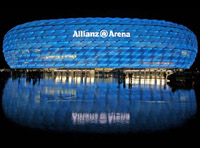China organizes pre-Olympic test events

The praise was as thick as the pollution.
Over two weeks of test events for the 2008 Summer Olympics, Beijing trumpeted its readiness and downplayed a host of concerns - including the capital's environmental problems.
The latest venue to get an Olympic seal of approval was the Wukesong Baseball Field, where Japan beat host China on Thursday in the final of a four-team tournament.
Like the rowing, canoeing, beach volleyball, archery and sailing venues, the facility on Beijing's western edge impressed.
"This being a test event, I couldn't be happier," said Murray Cook of the IBAF, world baseball's governing body.
"All we need is to do more training of the management of facility, training of groundkeepers, those who take care of the stadium," he said. Beijing's test events were "going more smoothly," than those at Athens, host of the 2004 Olympics.
Air pollution has been a worry for Beijing as it gears up for the Games, to be held Aug. 8-24, 2008. Jammed traffic and the possibility of protests by critics of the communist regime are also concerns.
To try to tackle the pollution, Olympic organizers set aside four days during the test events when more than 1 million private vehicles a day were kept off Beijing's gridlocked streets.
It was a partial success. Humidity and wind conditions kept the pollution from dispersing, but the air during the four-day drill would have been much worse without the vehicle restrictions, said Du Shaozhong, the deputy director of the Chinese capital's Environmental Protection Bureau.
"The test was successful. These four days the wind speed was slow, while the humidity and temperature were high," Du told reporters, noting a gray sky doesn't necessarily mean high levels of pollutants.
International Olympic Committee President Jacques Rogge warned during a visit this month that the competition schedule might have to be juggled on days when pollution was bad.
But the test events left no doubts the 37 venues will set new Olympic standards. China is spending US$40 billion (EUR30 billion) to remake the capital, although only a fraction of that will be invested in venues, with the rest going to new subways, roads, parks and other infrastructure.
Typical of the cutting edge designs and roomy facilities was the Shunyi rowing center in Beijing's northeast corner, which hosted the first test event, the World Rowing Junior Championships.
"It's fantastic," said Robert Treharne Jones, an Englishman workingas a consultant for rowing's world governing body FISA. "The moment I walked in through the door I was very impressed by the sheer size and scale of the whole venture."
Successful test events were also held at Olympic venues outside Beijing, with an equestrian competition in Hong Kong - Beijing organizers claimed they couldn't guarantee a disease-free zone for horses in the city - and sailing in Qingdao on China's eastern coast.
Only a lack of wind diminished from the sailing.
"From the athletes' point of view, all the facilities worked very well and all of the on-the-water officials coordinated very well," Davide Kellett, the vice president of the International Sailing Federation, told reporters.
Eleven test events were planned for Beijing for August, with more set for later in the year.
But there are still some wrinkles to be worked out.
Ground-level security was lax at some of the events. At the rowing and beach volleyball venues, checkpoints with guards and metal detectors were located at access points. Yet vehicles without passes easily drove into restricted areas and reporters found themselves wandering down passages leading to competition areas with no one to stop them.
Volunteers were enthusiastic and numerous, although they seemed poorly informed and English language skills were lacking.
"The venue is well prepared for the games and it's a very good atmosphere for the players to play," Australian referee Cameron Olson said at the beach volleyball site. "If some of the volunteers can improve their English in the next 12 months, that will make it better for everyone."
Access to information was also a problem in Beijing, the capital of a communist state that boasts a Cabinet-level Bureau of Secrets and restricts the media. Getting information on the baseball schedule from the Beijing Olympic Call Center took 15 minutes.
Chinese State television news Friday also pointed problems with signage and catering.
The test events also proved that the start of the Olympics next year will likely be a magnet for protesters and groups upset at China.
Before the one-year countdown on Aug. 8, various groups issued statements criticizing the lack of human rights or press freedoms in Beijing, which is also under fire for a perceived lack of action on pushing the Sudan government to do more to end the crisis in Darfur.
A group of activists also hung a banner on the Great Wall calling for Tibetan independence.
Subscribe to Pravda.Ru Telegram channel, Facebook, RSS!




